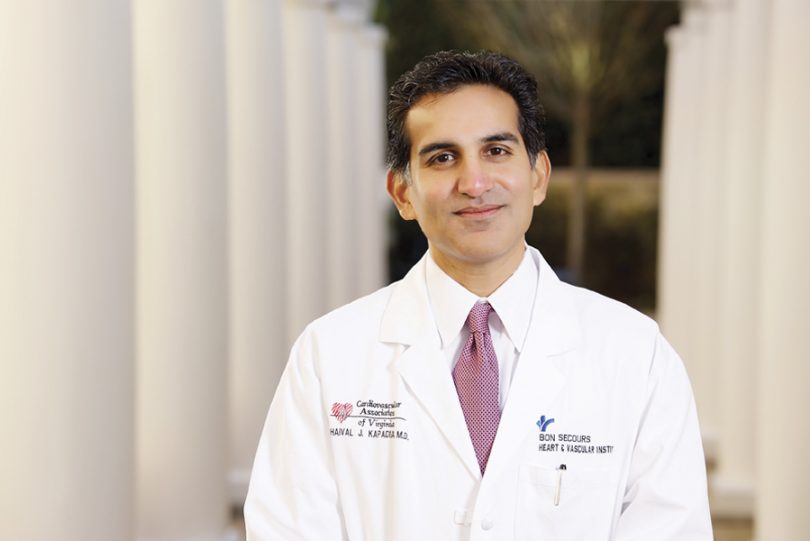Interview by Dianna Stiles
The scene in the movie is always the same. The actor stops talking mid-sentence, sweat beads on his brow, his breathing becomes labored and his hand clutches his chest before, finally, he collapses onto the floor. The audience knows the reason: heart attack.
As with many things depicted in film, reality is often quite different.
“That Hollywood heart attack is not a classic presentation,” says Dr. Shaival Kapadia, chief of cardiology at St. Francis Medical Center.
Kapadia says those situations do occur, but they are not as common as the movies would have you think. In fact, many people walk around every day ignoring symptoms of heart disease or even a mild heart attack. These symptoms can range from sweating to nausea to a feeling of heaviness or pressure in the chest.
“People just don’t recognize [symptoms] as easily as they should,” says Kapadia. “They think it’s heartburn and take some Maalox and go on.”
Women are less likely than men to recognize the warning signs, partly because they have more atypical symptoms. Missing is the pressure in the chest; instead, women tend to feel fatigued, dizzy, have shoulder pain or numbness in the arms.
Kapadia’s advice for both men and women is, “If something is making you feel bad, whatever it is, you should always seek help sooner rather than later. It could be a heart attack and … time is muscle. The sooner we can get in and fix that artery and restore blood flow [the better].”
The Diet Connection
With 1.5 million heart attacks a year and 500,000 of them fatal, heart disease is the No. 1 cause of death for both men and women in this country.
Medical advances have developed a new class of drugs called statins, such as Lipitor, Crestor and Zocore, which reduce, but do not eliminate, the risk of a cardiac event.
“People still are of the mindset that, ‘If I take these pills, I’m not going to have a heart attack,’” says Kapadia. “People are looking for that magic bullet, and there isn’t one.”
In addition to medication, most heart patients must lose weight to effectively control their disease, a move that often coincides with a complete diet overhaul—veering away from processed foods that are high in carbohydrates to a more plant-based diet full of fruits and vegetables.
But convincing his patients to abstain from meat and dairy is a hard sell. Which is why Kapadia recommends a Mediterranean diet emphasizing fruits, vegetables, whole grains and fish with moderate amounts of poultry and dairy and a minimal amount of other meats and sweets.
“At the end of the day it boils down to avoiding processed and packaged food. [It’s about] eating whole foods,” he adds.
Convincing patients to alter their lifestyle is a huge challenge, a step many aren’t willing to take unless they’ve had a heart attack. Kapadia is hoping to change that mentality.
Kapadia uses two screening methods—coronary calcium scoring and advanced lipid testing—to assess patients’ heart health.
The results from these two tests identify the early stages of heart disease, and in Kapadia’s medical practice, have served to be the wake-up call patients needed to make the lifestyle changes necessary for heart health.
IN HIS WORDS
You have to walk the talk, otherwise you have no credibility. I run, do P90X and follow a pescetarian diet (a vegetarian that eats fish). But I would like to evolve to a more vegan diet, eliminating all animal products and dairy. But that would mean no more cheese and, I really like cheese!
The whole fat thing is somewhat mythical, I think it really comes down to eliminating simple carbohydrates—white flour and white sugar. It’s not about eating low-cholesterol or low-fat foods, it’s about eating less carbohydrates because excess carbohydrates are stored as body fat. Reducing your carbs goes to managing your cholesterol.
I like author Michael Pollan’s philosophy about diet: ‘Eat food. Not a lot. Mostly plants.’ If you look at folks who are purely vegan or purely focused more on a plant-based nutritional diet … by that I mean, no animal products or dairy, there is really good data that those people don’t develop plaque in their arteries or are less likely to.
There’s no question that genetics load the gun, but what pulls the trigger is really the environment, diet and lifestyle. Smoking, diabetes, sedentary lifestyle and stress, all those things …they pull the trigger and determine when that genetic potential plays out.
Smoking is terrible for your heart. Nicotine causes constriction of the blood vessels and inflammation in the arteries. Healthy arteries are like a Teflon-coated cooking pan, anything can go past it, nothing sticks. But once you interrupt that surface, however you do it, and smoking is a big piece of it, then plaque starts to develop. And it can start in our twenties and thirties.
BIO
AGE
47
OCCUPATION
Chief of Cardiology at St. Francis Medical Center, practicing physician with Bon Secours Heart and Vascular Institute
BIRTHPLACE
Richmond, Va.
CURRENTLY RESIDES
West End, Henrico County
FAMILY
Married to Jill with two children, Sonja (13) and Shaan (11)
EDUCATION
Medical degree from the University of Virginia; internship and residency in internal medicine at the Medical College of Virginia; fellowship in cardiology at Brown University
COMMUNITY INVOLVEMENT
Working with Bon Secours to establish the Center for Early Detection
PROFESSIONAL ASSOCIATES
American College of Cardiology, American Society of Nuclear Cardiology
RECENT AWARDS
Named a “Top Doc” in Richmond Magazine from 2006 to 2011

